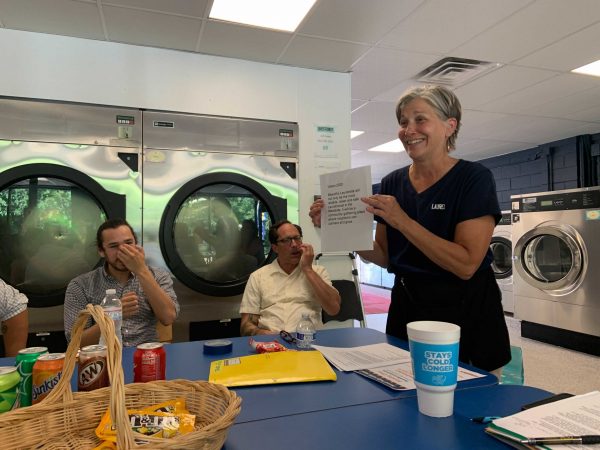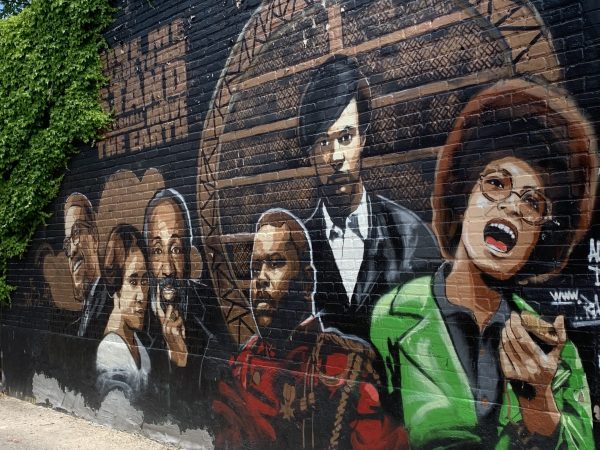
Libraries Without Borders US
It's an urgent matter. The need to read. Make a donation!
LWB US in Minnesota: A community fighting for affordable housing
Libraries Without Borders US (LWB US) is committed to delivering access to information by meeting people where they are with the resource they need most, from parks in Baltimore to laundromats in Minnesota. Earlier this year, LWB US implemented programming at Wash and Learn Initiative (WALI) laundromat Beautiful Laundrette in St. Paul, a community living through a housing and public health crisis with longstanding inequities in education becoming more apparent and alarming.
The ongoing public health crisis has presented many unprecedented challenges, particularly for low-income households as well as for many Black, Indigenous, and people of color. Before the coronavirus, more than 20 million Americans—mostly BIPOC, rural, and/or underserved communities—lacked reliable access to the internet and over 25% of US adults lacked access to a desktop or laptop computer. This digital divide builds on long-standing inequities in education and access to information, inequities which have left 21 percent of US adults functionally illiterate. Libraries and local non-profit organizations are well-positioned to address these challenges and meet the need for early childhood, literacy, technology, and civic spaces. And yet, millions of people in America lack the time, money, or are unaware of the scope of services available.

Firstly, it is important to know that the median rent for two- and three-bedroom rentals in St. Paul increased by 4% and 8% respectively since 2020. More importantly, recent research showed the average rent increase in Minneapolis was 2.7% from 2013 to 2018. For a city whom over 51% of residents are renters, this increase is alarming and is representative of a lack of affordable housing, a decrease of federal investment in housing development, large inequalities in the racial homeownership gap, and even racial discrimination in access to housing.
A majority of renters in St. Paul are people of color. The Twin Cities region accounts for 76% of BIPOC households in the state, only 40% of them are homeowners compared to 75% of White households. Research from the Center for Urban and Regional Affairs shows that median rent doesn’t increase more than 3% annually. However, researchers also concluded that Black, Indigenous and other households of color experienced the most egregious rent increases.
This issue is pressing and action needs to be taken now.

Housing Equity Now St. Paul (HENS), a coalition of community and neighborhood groups, is working to curb the displacement. Minnesota law dictates that cities are not permitted to institute rent controls unless it’s through a ballot initiative, such as rent stabilization. In context, rent stabilization is a policy initiative that attempts to reduce the displacement of renters and increase housing affordability and stability. In an effort to get rent stabilization on the upcoming November ballot, HENS delivered over 9,100 signatures to the elections office in St. Paul Ramsey County. If approved by voters, the policy would limit rent increases for all rental units across the city to 3% over a 12 month period
The passion and pride for this campaign is illuminating from St. Paul residents and tenants. They’ve started a conversation on what it takes to create racial justice in housing and have shown how impactful community-led, grassroots efforts can be. HENS described it best:
“We were grounded and inspired by the experiences, tenacity, and love of our neighbors as we connected with tenants who have been displaced because of rent spikes; households who live in constant fear that their landlords will increase rents beyond their means; property owners who treat their residents with respect and dignity and want to see the same for all renters; homeowners who recognize that rent stabilization provides tenants the same stability they have with their mortgages; teachers who see every day the dramatic and disproportionate impact housing instability has on their students – and countless other affirmations that this policy is needed and supported by a wide cross-section of St. Paul residents”
LWB US is continuously inspired by the diverse communities in Minnesota working hard to ensure access to affordable housing. We believe that access to knowledge, information, and education is a fundamental right, and LWB US will continue to bring libraries, community-based organizations, businesses, government agencies, and communities to bridge this discrepancy.
Given the urgency of addressing the stark increase in rent in St. Paul, LWB US implemented programming at WALI location Beautiful Laundrette to fit the needs of the community. There, the West Side Community Organization (WSCO) hosted a Rent Stabilization Day and partner organization Neighborhood House hosted a pop-up housing clinic weekly on Wednesdays, where community members could learn about their rights as tenants and seek housing help.
We will continue to advocate for housing affordability and stability by raising awareness of initiatives and resources within the St. Paul community.
Given the urgency of addressing the stark increase in rent in St. Paul, LWB US implemented programming at WALI location Beautiful Laundrette to fit the needs of the community. There, the West Side Community Organization (WSCO) hosted a Rent Stabilization Day and partner organization Neighborhood House hosted a pop-up housing clinic weekly on Wednesdays, where community members could learn about their rights as tenants and seek housing help.
We will continue to advocate for housing affordability and stability by raising awareness of initiatives and resources within the St. Paul community.